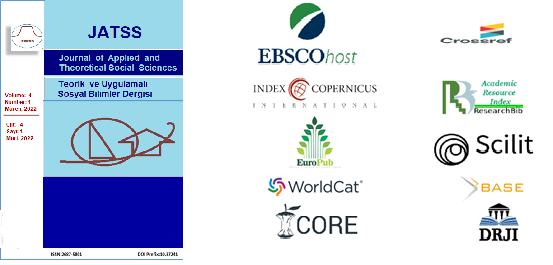Nijerya'da Sağlık Harcamalarının Sağlık Durumuna Etkisinin Analizi
Özet
Sağlık hizmetlerine yapılan harcamalar, bebek ölüm hızının azaltılması yoluyla sağlık koşullarının iyileştirilmesi için hayati önem taşımaktadır. Bu çalışma, 1986'dan 2020'ye kadar yıllık zaman serisi verilerini kullanarak Nijerya'da sağlık sektörüne yapılan devlet harcamaları ile sağlık sonuçları arasındaki ilişkiyi araştırmayı amaçlamaktadır. Modelin bağımlı değişkeni sağlık göstergesi olarak kullanılan bebek ölüm hızı iken, bağımsız değişkenleri; sağlık harcaması, cari harcama, kişi başına GSYİH ve eğitim düzeyidir. Çalışmanın, analizinde eş-bütünleşme ve Hata Düzeltme Modeli (ECM) kullanmıştır. Sonuçlar, sağlık harcamalarının ve tekrarlayan harcamaların, incelenen dönemde Nijerya'da bebek ölümlerini azalttığını göstermiştir. Ayrıca, kişi başına düşen GSYİH ve eğitim düzeyi, bebek ölüm hızı ile negatif ve önemsiz bir ilişkiye sahipti. Bu ampirik bulgulara dayanarak, çalışma, vatandaşların daha iyi ve daha gelişmiş sağlıklı yaşam koşullarının gerçekleştirilebilmesi için hükümetin sağlık sisteminin finansmanına ve iyileştirilmesine öncelik vermesi gerektiğini ortaya koymuştur.
##plugins.generic.paperbuzz.metrics##
Referanslar
Anyanwu, C.J. &Erhijakpor, A.E. (2009). Health expenditures and health outcomes in Africa.Journal of Theoretical Social Psychology, 21(2), 400-433. DOI: https://doi.org/10.1111/j.1467-8268.2009.00215.x
Byaro, M. &Musonda, P.( 2016). Impact of public health expenditure on infant and under-fivemortality in Tanzania (1995-2013): An application of bayesian approach. Journal of Economics and Sustainable Development, 7(12), 178 – 187.
Boachie, M. K.&Ramu, K. (2015), Public health expenditure and health status in Ghana. Munich Personal RePEc Archive (MPRA) Paper (66371).
https://mpra.ub.uni-muenchen.de/66371 (Accessed: 29.01.2022).
Barenberg, A, Basu,D. &Soylu,C. (2015), The effect of public health expenditure on infant mortality: Evidence from a Panel of Indian States, 1983-84-2011-12 Economics Department Working Paper Series. 199. http://scholarworks.umass.edu/econ_workingpaper/199 (Accessed: 29.01.2022). DOI: https://doi.org/10.1080/00220388.2016.1241384
Central Bank of Nigeria (2020). Central Bank of Nigeria Statistical Bulletin,. Abuja, Nigeria
Dwivedi, D. N. (2008).Managerial Economics. New Delhi: Vikas Publishing House Ltd.
Dornbush, R. & Fischer, S. (2004).Macroeconomics New Delhi: Vrinda Publications Ltd.
Eboh, A. Abba,J.Y. &Fatoye,A.H. (2018). Impact assessment of the public health expenditure on the health outcome in Nigeria.International Journal of Social and Administrative Sciences 3 (2), 62-72 DOI: https://doi.org/10.18488/journal.136.2018.32.62.72
Jhingan, M.L. (2010). The Economics of Development and Planning. Delhi: Vrindapublications Ltd.
Micheal,K, Ramu,K&Tatjana,P. (2018).Public health expenditures and health outcomes:
new evidence from Ghana. International Journal of Health 6( 5),8 –25
Musa, N. (2021). “Components of health expenditures and life expectancy in Nigeria”. A paper presented at Tekirdag Namik Kemal University, Faculty of Economics and Administrative Sciences International Symposium on Public Finance,Turkey, May 24- 25, 2021
Muftaudeen, O &Bello,O.O.(2014). Public healthcare expenditure and health sector performance in Nigeria: Implications for sustainable economic development. Journal of Economics and Finance, 4(3), 39-55 DOI: https://doi.org/10.9790/5933-0433955
Novignon, J., S. Olakojo& J. Nonvignon (2012). The effects of public and private health care expenditure on health status in Sub-Saharan Africa: New evidence from panel data analysis. Health Economics Review, 2(1), 120-135. DOI: https://doi.org/10.1186/2191-1991-2-22
Oluwatoyin, M.A. Folasade,B.A. &Fagbeminiyi, F.F.( 2015). Public health expenditure and health outcomes in Nigeria. International Journal of Financial Economics, 4(1), 45-46.
Pesaran, M.H, Shin Y. & Smith,R.(2001). Bounds testing approaches to the analysis of level relationships, Journal of Applied Econometrics, 16, 289-326 DOI: https://doi.org/10.1002/jae.616
Richardson, K.,J. Chisom E.. &Omeje,M.O. (2017). Public health expenditure and health outcomes in Nigeria. American Journal of Biomedical and Life Sciences, 5(5), 96-102 DOI: https://doi.org/10.11648/j.ajbls.20170505.13
World Bank (2020). World Bank World Development Indicators Database (WDI). Washington D.C. World Bank
World Bank. (2008). World Development Report: Investing in Health. Oxford University Press: New York, NY.
World Bank. (1993), World Development Report 1993: Investing in Health. Oxford University Press: New York, NY.
World Health Organization (2015).Global Health Observatory data: Life expectancy. Geneva, Switzerland: World HealthOrganization (WHO).
World Health Organization (2016).World health statistics. Monitoring health for the SDGs. Available from http://www.who.int/gho/publications/world_health_statistics/2016/en/ (Accessed: 25.8.2021).
Yaqub, J.O., Ojapinwa,T.V. &Yussuff, R.O. (2012). Public health expenditure and health outcome in Nigeria: The impact of governance. European Scientific Journal, 8(3), 189-201.






















